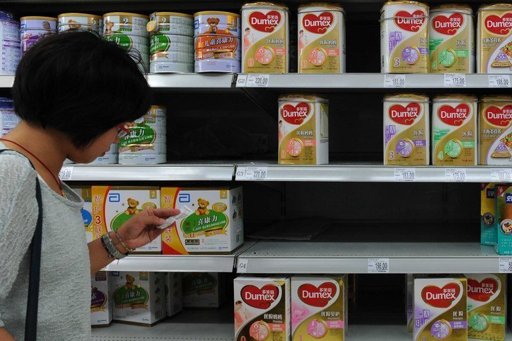China said Wednesday it has fined six mostly foreign baby formula producers including New Zealand's scandal-hit Fonterra a total of $108 million for price-fixing, as it seeks to cool public anger over the sector.
The penalties -- also levied against firms from the US, France, the Netherlands, and one Chinese company -- came after a five-month inquiry by the National Development and Reform Commission (NDRC), China's top economic planner.
They were a "record high" in Chinese anti-monopoly rulings, the official Xinhua news agency said.
They also come in the middle of the latest safety scare over formula, in which Fonterra-related products have been recalled in several countries over concerns they could be tainted with a bacteria that can cause potentially fatal botulism.
It said Wednesday that all the affected items had been removed from retailers' shelves.
China is the world's biggest market for formula and foreign-branded products are in high demand after repeated safety scandals involving domestic products -- including one in 2008 when six children died and 300,000 were sickened.
Prices are high as a result, leading to frustrations among consumers.
The NDRC said in a statement it fined Mead Johnson and Abbott from the US; Dumex, a subsidiary of France's Danone; a China arm of Royal FrieslandCampina of the Netherlands; Fonterra and China's Biostime.
The firms set minimum prices with distributors and punished dealers who did not comply, the NDRC said, and their actions reduced competition and "unjustifiably maintained high milk powder prices".
"They undermined the fair market competition order and harmed consumers' interests," it added.
Mead Johnson said it had been fined 204 million yuan ($33 million), adding it remains committed to the country that is "one of the company's most important markets".
Biostime, based in the southern city of Guangzhou, said in a filing to the Hong Kong stock exchange that it would pay a fine of 163 million yuan "in a timely manner".
The value is around six percent of the company's sales revenue in the previous year -- the highest rate among all firms punished -- because its violations were "grave" and it "failed to rectify its wrongdoings in an active way", the NDRC said.
Fonterra said it was fined 4.5 million yuan and accepted the decision.
Its chief executive Theo Spierings said all tainted products, which were distributed in countries ranging from New Zealand to Saudi Arabia, had been removed.
"All the stocks have been contained, everything is out of the market," he told reporters in Auckland. "It's in warehouses and there is little or no more risk for consumers."
The NDRC said Dumex was fined 172 million yuan, Abbott 77 million yuan and FrieslandCampina 48 million yuan.
The inquiry results come as Chinese authorities are also investigating 60 foreign and domestic pharmaceutical firms over how they set prices.
In a high-profile case last month they arrested four executives from British drug firm GlaxoSmithKline (GSK) for alleged bribery and other offences.
China's Commerce Ministry denied the probes were targeting foreign firms. Such a view was "absolutely ungrounded", it said in a statement on its website.
In stock trading Friday, Fonterra closed up 1.15 percent in Wellington, while Biostime shares jumped 6.46 percent in Hong Kong trading. Shares in Danone were down 0.72 percent in Paris at lunchtime.
Shaun Rein, the managing director of China Market Research Group in Shanghai, said authorities were right to bring down prices of vital goods such as baby formula and medicine.
"Prices on both have been spiralling out of control over the last 10 years," he said.
Beijing tended to target foreign firms because "it scares everybody else into line" but avoided antagonising powerful domestic players.
But Rein argued that firms may have inflated baby formula prices partly as a marketing ploy to signal to consumers that they represented the quality and safety they sought.
The NDRC launched the dairy products investigation in March, mostly targeting overseas firms, and several of them announced price cuts last month.
Three companies -- Wyeth, which is owned by Swiss giant Nestle, Japan's Meiji, and Chinese firm Beingmate -- had been exempted from punishment, the NDRC said.
They provided important evidence and carried out active self-rectification, it added.


















































